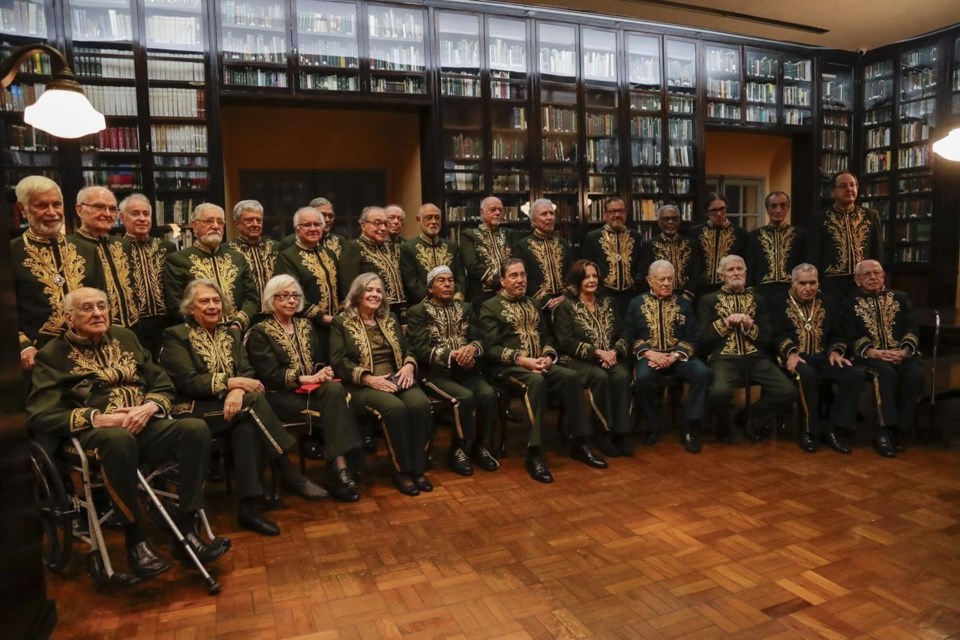RIO DE JANEIRO (AP) — It was a historic week for Brazil’s Krenak people, getting both literary esteem and an apology for dictatorship-era crimes — both firsts for the Indigenous people of the country.
On Tuesday, the indigenous group received a formal apology for human rights abuses they suffered during the military dictatorship (1964-1985) — a first in Brazil. Then on Friday one of their leaders, renowned writer and environmentalist Ailton Krenak, earned a seat at the Brazilian Academy of Letters, the country's most exclusive literature body.
During Friday's ceremony, Krenak received a sword, a necklace and a diploma from his peers. Wearing an Indigenous headband and the academy's traditional green vest adorned with golden embroidery, he said he had come “to bring more languages” to the room.
“My relatives have come from different parts of Brazil to be here. I can't mention every ethnicity here, there are many,” Krenak said in his speech. “I am here. I am Guarani, I am Kayapo, I am Xavante, I am them all.”
Earlier, Krenak told the academy he wants to create a platform to make the institution's documents and books available in Indigenous languages, many of which are on the verge of disappearing.
“We could do this for every native tongue. It is completely up to the Brazilian Academy of Letters to include another 170 languages beyond Portuguese,” Krenak said.
“The idea is to prioritize spoken language, and not text. What threatens these (Indigenous) languages is the lack of speakers,” he added. Among notable members of the Brazilian academy are Grammy-award winner Gilberto Gil and actress Fernanda Montenegro, who was nominated for best actress in the 1999 Academy Awards.
Tuesday's apology was also a ceremonious event. On a stage featuring Brazilian states' flags and in a crowded room packed with Indigenous people, some of whom were wearing traditional headdresses and black body paint, law professor Ene√° de Stutz e Almeida knelt before Indigenous leader Djanira Krenak.
“In the name of the Brazilian State, I want to ask forgiveness for all the suffering your people have gone through,” said de Stutz e Almeida, the president of the amnesty commission attached to the human rights ministry responsible for investigating the dictatorship's crimes.
Those crimes included forcing the Krenak off their land in southeastern Minas Gerais, where a so-called reformatory site was built. There, Indigenous peoples were tortured, beaten and forbidden to speak their languages.
The military also created a rural guard made up of Indigenous people, who were taught torture techniques.
The commission also extended an apology to the , who were also chased off their land in Mato Grosso do Sul state to make way for farms run by non-Indigenous Brazilians.
Ailton Krenak fled his home territory when he was about 11 years old, only to return as an adult.
The military thought “that Brazil could deal with native peoples in a paternalistic way and could prepare them for civilization,” Krenak told The Associated Press in an interview following Tuesday's apology.
The cases about the Krenak and the Guarani Kaiow√° Indigenous groups were first rejected by the amnesty commission in 2022, when members appointed by former President Jair Bolsonaro's government were in place. Prosecutors appealed both decisions.
The Bolsonaro presidency (2019-2022) facilitated mining, logging and large-scale agriculture in Indigenous territories.
President Luiz In√°cio Lula da Silva has long advocated for Indigenous peoples' rights and created eight new Indigenous-only territories since taking office for a third, non-consecutive term in 2023. He climbed the presidential ramp alongside .
In Lula's first year, the amnesty commission changed its rules to allow for apologies to be issued not only to individuals but entire groups, paving the way for Tuesday’s ceremony — and potentially many more.
The state's first-ever apology regarding the persecution of Indigenous peoples during the dictatorship echoes for its role in the capture and enslavement of millions of Africans.
“All of the more than 300 Indigenous groups that exist in Brazil have a story to tell about the military period and, unfortunately, from my understanding, it’s not a good one,” said Rubens Valente, author of “The Rifles and the Arrows,” a seminal book about the military regime's impact on Indigenous communities.
Indigenous peoples in contemporary Brazil continue to face threats to their livelihoods. A right-leaning Congress is seeking to pass legislation that does away with protections of Indigenous peoples’ land rights. The country's top court is set to rule on the matter.
Ailton Krenak also said that an apology doesn't change the deep-seated social and economic problems faced by Indigenous peoples.
“I keep thinking about the situation of the Guarani Kaiowá who continue to be decimated by agribusiness. Will an apology stop the violence against them?” he said.
Indigenous peoples' memory, rites, culture and tradition have already suffered irreparable damage, Krenak said.
”If the old die, how will the young invent culture? This is the subject of my work. That’s why I write," he added. ___
A previous version of this story misidentified Indigenous rights activist Shirley Djukurn√£ Krenak as Ailton Krenak's daughter. She is not.
___
Savarese reported from Sao Paulo. Gabriela S√° Pessoa contributed to this report from Sao Paulo.
___
Follow AP’s coverage of Latin America and the Caribbean at
Eléonore Hughes And Mauricio Savarese, The Associated Press




